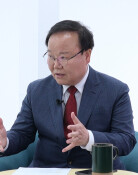Emphasizing Presidential Rights and Ignoring the Constitution
Emphasizing Presidential Rights and Ignoring the Constitution
Posted June. 28, 2007 03:14,
In a statement released on the morning of June 27, President Roh Moo-hyun urged lawmakers to convene a special session of the Assembly in July to deal with legislation relating to the welfare of the people such as National Pension Act as soon as possible. He is apparently pointing out to the Grand National Party (GNP) that Blocking the legislation is not in the interest of the general public, and is only in the interest of a certain political party. In response, the GNP rebuked President Roh, asking, Is public welfare a concern of the President? How could he blame us? in rejecting the idea of a special session of the Assembly.
The 15-minute statement, broadcast live on TV, was made for emphasizing the need to pass major bills to the people, as the Presidents address plan at the National Assembly was canceled during the extra session in June. President Roh accused the GNP of being responsible for dealing with the legislation, explaining details of the delayed process. The president condemned the main opposition party, saying, The GNP reiterated that peoples livelihoods should not be used for political purposes, but they are deliberately putting off handling the legislation. Their actions are contradictory to their words, and their irresponsible behavior is undermining their political trust.
President Roh also complained that The Constitution is being ignored regarding the rejection of his address in the extra session of the Assembly, which he had proposed. He said that A presidential speech before the National Assembly needs no permit from the National Assembly because it is the constitutional right of the President. I am deeply concerned about the future of this countrys democracy as I see the reality that the National Assembly shows no respect for the President and bars the President from exercising his rights.
However, many point out that his criticism is not persuasive as he himself has made several remarks undermining the Constitution. For example, he stirred public criticism by using explicit expressions that compromised the credibility of the Constitution in an appraisal forum for the Participatory Government. In addition, he harshly criticized decisions made by the Constitutional Court and National Election Commission. When the Constitutional Court ruled that relocating administrative capital was unconstitutional, based on the Customary Constitution in October, 2004, the president said, I have never heard of the theory of the Customary Constitution. Besides, when the National Election Commission found that the presidents remarks violated election laws on June 7 and 18, he filed a constitutional petition against the decision, saying, The election laws are hypocritical systems which make it impossible for a President to make political remarks.
In the statement, he also raised the issue of the GNPs strategy to connect Private School Law to the National Pension Act and the Law School Act, saying What is more problematic is that the GNP is taking the National Pension Act and the Law School Act hostage. In response, Kim Hyeong-oh, floor leader of the GNP, reprimanded the President, stating, The National Pension Act was rejected due to the Uri Party and its defectors; so you should persuade them first. The GNP also commented that We cannot call a bill, which needs consultation and entails much political controversy, bill for the peoples welfare. In addition, in response to the demand by the President to pass the Rental Housing Act, for the peoples housing welfare, the party rebuked that The Ministry of Construction and Transportation should first answer whether it is appropriate to construct 40,000 of 50, 000 houses, which will be built as reserves, in Seoul.
The GNP criticized the Presidents views, saying, It makes no sense to restructure nine ministries when there are only eight months remaining in the Presidents term, over the issue of revised bill for the Governmental Organization Act, which mainly focuses on the creation of a Food Safety Agency. Furthermore, the GNP pointed out that The Korean Broadcasting Commission and the Ministry of Information and Communication have wasted years defending their turf over the law to establish a Broadcasting and Telecommunication Commission. Fortunately, with the help of the GNP, a special commission was set up. The opposition party claimed that It is absurd to commit an organization under the government to investigate the presidents relatives, in addressing the law to set up an organization for dealing with corruption scandals among public servants.
jyw11@donga.com taylor55@donga.com
Headline News
- Med professors announce intention to leave hospitals starting Thursday
- Bridge honoring Sgt. Moon Jae-sik unveiled in Pennsylvania
- Chief of Staff Chung tells presidential secretaries to stay away from politics
- US FTC bans noncompete agreements
- N. Korea launches cyberattacks on S. Korea's defense companies







